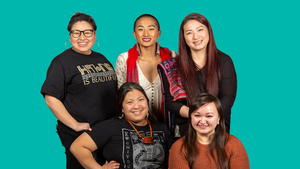Review: FACE TO FACE: HMONG WOMEN'S EXPERIENCES at Park Square Theatre
 Theater can be a place to get to know your neighbors, and their stories. That's what's happening in a short run of an original work about contemporary Hmong-American women at the Park Square Theatre in Saint Paul. It was devised there, based on multiple interviews conducted by Sara Zatz, the Associate Director of the Ping Chong Company from New York City, and playwright Katie Ka Vang. Zatz oversees the community outreach work of that company, which is extensive. One ongoing program under the umbrella title UNDESIRABLE ELEMENTS has created more than 60 original evenings of theater since 1992, all exploring issues of culture and identity in minority communities of many different kinds. FACE TO FACE is the latest in the series.
Theater can be a place to get to know your neighbors, and their stories. That's what's happening in a short run of an original work about contemporary Hmong-American women at the Park Square Theatre in Saint Paul. It was devised there, based on multiple interviews conducted by Sara Zatz, the Associate Director of the Ping Chong Company from New York City, and playwright Katie Ka Vang. Zatz oversees the community outreach work of that company, which is extensive. One ongoing program under the umbrella title UNDESIRABLE ELEMENTS has created more than 60 original evenings of theater since 1992, all exploring issues of culture and identity in minority communities of many different kinds. FACE TO FACE is the latest in the series.
Minnesota is home to the second largest group of Hmong immigrants to this country. They arrived here in successive waves following the end of the Viet Nam war. They had to leave their homes in the mountainous regions of Laos since they had been recruited by the CIA to serve as guerilla fighters and medics or nurses on the US side and were at risk once the Vietnamese prevailed.
Zatz and co-writer/director Vang, a Hmong-American artist who holds an MFA from Brown's renowned playwriting program, have shaped the hours of documented interviews into a tight 75 minute piece of personal truth-telling, performed by five women, all born in this country between 1984 and 1996. The performers have final say over the text they deliver, which is structured chronologically. Sitting on stage with standing mics, they read from the script, punctuating certain moments with repetition and brisk unison hand claps. Thus FACE TO FACE bears more resemblance to a Moth story telling hour (where individuals recount personal anecdotes they've honed with the help of professional directors) than a fully staged production.
That's not to take away from the power it holds to help us understand more deeply the experiences of these five women as they seek to establish their own identities in the face of multi-generational trauma. Hmong culture is patriarchal, and clan and family honor are more important in Hmong tradition than personal ambition, so the process of claiming their own authentic and evolving paths has been fraught with familial friction, braided together with deep loyalty.
Starting with a rapid-fire recounting of the secret war (including the fact that Hmong died at 10 times the rate of US soldiers) that led to the Hmong resettlement in this country, the five performers share their private journeys up to the present day. There's a mom of six who is also an entrepreneur (Pang Foua Xiong), a disability activist who was born with spina bifida and uses a wheelchair (Houa Moua), a spoken word poet (Laurine Chang), a teacher of traditional dance (Pang Chai Xiong), and a body image activist who also identifies as a healer (Cydi Ywj Siab Yang). Those capsule descriptions don't fully honor their diversity, which is underscored by their common identities as the bilingual daughters of immigrants.
The specificity of their experiences elevates this experience above conventional platitudes and the directness with which they speak to the audience makes this an evening that is full of dignity rather than sentimentality. I commend the performers, as well as the infrastructure and training that the Ping Chong company provides to groups that want to undertake projects of this kind.
I also respect the audience that chooses to come and learn; I encourage you to do so. School teachers and librarians and therapists and medical people working in the Twin Cities, especially, take note: witnessing these stories builds the kind of cultural literacy that can help any of us from other backgrounds be of greater use to young Hmong-Americans in the community. Performances are in the small basement thrust space at Park Square through March 15.
Photo credit: Tomas Leal
Reader Reviews

Videos
